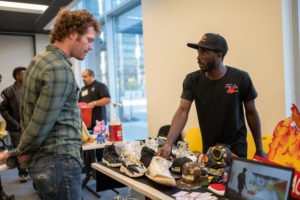Nawal Denard knows the quality of the hand-crafted clothing, jewelry and shoes from her native Ghana in West Africa, and she is proud to sell these dynamic textiles through her Detroit-based business, House of African Prints.
What she didn’t know, however, was marketing. Her success at pop-up shops gave her the inspiration to search for help. To build her business in a sustainable way, Denard applied and was accepted to the Detroit Neighborhood Entrepreneurs Project, a program that brings together the University of Michigan’s students and professors to help entrepreneurs working in the city’s neighborhoods.
As a result, Denard said she is receiving assistance, research and information on finding her customers and defining her niche.
“I needed help and the University of Michigan came to the rescue,” said Denard, who is now working on expanding her products to include pets as well as exploring other sales channels for her products.
The Detroit Neighborhood Entrepreneurs Project (DNEP) held its first Small Business Showcase Thursday, bringing together more than a dozen of its current participants, including Denard. Their business ideas ran the gamut from wellness subscription boxes to a new gaming platform to a chemistry-inspired fashion line. The event at the U-M Detroit Center also featured its food entrepreneurs, including soul food, French crepes and Afro-Caribbean specialties.

The Detroit Neighborhood Entrepreneurs Project brought together more than a dozen of its current participants including Anthony E. Thompson II of The Upperow Luxury Fashion House.
DNEP works like a small-business accelerator, connecting Detroit businesses with U-M faculty, staff and students from the Law School, Ross School of Business, Stamps School of Art & Design and the Ford School of Public Policy, said program manager Justin Erickson. U-M matches faculty and students with the entrepreneur for a semester or year-long project. U-M students do everything from strategic consulting, legal assistance, design strategy or offer insights on how to unravel any complex business situation.
Since the Project began in 2016, it has provided more than 3,500 hours of free services to 120 entrepreneurs in Detroit’s small business community. Of these clients, 85 percent are minority owned and 70 percent are female owned, Erickson said.
One example is JaBett M. Glenn, founder of Rock Your Month, an online subscription service that provides feminine hygiene products in attractive packaging. The monthly packages can be adjusted as needed and shipping anywhere in the world, Glenn said.
Glenn, a Wayne State University graduate and U.S. Air Force veteran, created her business to help young women like her daughter get past the stigma of shopping for these products or finding creative ways to carry them. That is why Rock Your Month provides cute totes with empowering messages so girls and women of any age will feel good carrying them, Glenn said.

Whitney Lewis, left, of Boiling Point Detroit. Of the free services provided to 120 entrepreneurs in Detroit’s small business community, 85 percent are minority owned and 70 percent are female owned.
She has used her DNEP partnership to work with students on user surveys and research, boosting the messaging, branding and design of Rock Your Month to gain more customers.
“When these students and me got together, it was fire,” Glenn said.
Tamu McKaye also utilized DNEP to do customer surveys and create a strong brand for her culinary company, Crepe City. McKaye, a trained pastry chef, hopes to launch Crepe City as a mobile food truck concept soon, expanding on her catering and special-event business.
“It was like a master class,” said McKaye of the U-M Ross School of Business graduate students who worked with her on unlocking the secrets of consumer behavior and brand development.
Having a relationship with U-M’s business experts are why Deirdre Roberson feels her business, Eumelanin, now has the power to scale into a larger, fashion-forward enterprise. A chemist by trade, Roberson said her business combines “science, self-love and style” by highlighting the chemical structure of melanin in her packaging, products and brand.
“It’s hard to work in a business and work on it at the same time,” said Roberson, who said she signed up for DNEP to get feedback on her jewelry and clothing line. “U-M students at the Ross School helped me research places to sell and how to build brand awareness. … Now, I feel like the brand has been validated and I’m ready to build.”
Written By: Karen Dybis, special to Michigan News, reposted from https://detroit.umich.edu/news-stories/detroit-neighborhood-businesses-blooming-after-tapping-u-m-expertise/
Photos By: Eric Bronson, Michigan Photography
